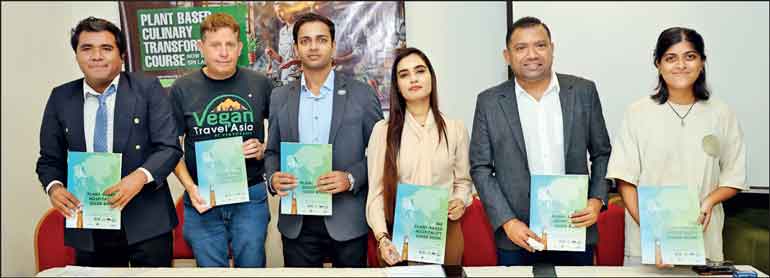Saturday Feb 21, 2026
Saturday Feb 21, 2026
Friday, 20 September 2024 00:10 - - {{hitsCtrl.values.hits}}

Panellists at the launch of the plant-based culinary transformation course at the recently held press conference at Ranbath; (from left): EarthLanka Youth Network Co-Founder Sudarsha Chanaka De Silva, Vegan Travel Asia and VegVoyages Foundation Co-Founder Zac Lovas, Animal Climate Health Save Foundation/Plant Based Food Consultant Narhari Gupta, The Save Movement and Plant-Based Treaty Campaign Regional Liaison (Asia) and Animal Climate and Health Save Foundation India Director Aprajita Ashish, Clean Ocean Force Lanka Chairman and Co-Founder Jerome Fernando, and The (Bio) Diversity Project Founder Kasumi Ranasinghe Arachchige
By Tania de Silva
In a transformative move, Sri Lanka is setting the stage to become Asia’s premier vegan-friendly destination.
Leading this initiative is a collaboration among the VegVoyages Foundation, Vegan Travel Asia, Animal Climate and Health Save Foundation India, The Save Movement, and Thrive Philanthropy, working together with Sri Lanka Tourism.
They are introducing a specially tailored plant-based culinary course and workshop, available in both Sinhala and English. The first workshops were held on 6 and 7 September.
The workshop, designed specifically for Sri Lanka’s hospitality sector, aimed to foster a global shift towards a plant-based food system while incorporating sustainable practices to address the climate emergency. Key supporters of this groundbreaking initiative include The (Bio) Diversity Project’s Kasumi Ranasinghe, Clean Ocean Force Lanka’s Jerome Fernando, and EarthLanka Youth Network’s Sudarsha de Silva.
Chefs, business owners, and anyone interested in the plant-based industry will find this workshop an invaluable opportunity to acquire cutting-edge knowledge and practical skills at no financial cost. For hospitality professionals, this workshop presentted a chance to stay ahead of industry trends and advance their careers, making it a pivotal moment in the competitive hospitality sector.
Recently at the Sri Lanka Institute of Tourism and Hotel Management, a Hospitality/Culinary Workshop engaged 100 students and teachers. The Southern Hotel Association also held a workshop at Triton Ahungalla which brought together 30 top chefs and hotel general managers, alongside the SLTDA Director General and the Director of Operations, for in-depth discussions. The MJF Centre in Moratuwa and Kalkudah hosted a workshop, empowering 41 students from culinary and hospitality schools.
At the Colombo University, food technology and nutrition were highlighted for 40 students under the guidance of Dr. Kalpani Marasinghe. The day concluded with a workshop at the SLTC University for hospitality degree students, where students delved into industry details with expert Ramitha Pathirana.
The Save Movement Regional Liaison for Asia and Animal, Climate and Health Save Foundation Plant-Based Treaty Campaign Director Aprajita Ashish emphasised the workshop’s importance: “This initiative is vital in combatting climate change and promoting sustainability. It aligns with eight of the 17 Sustainable Development Goals (SDGs), including responsible consumption and production, climate action, and good health and well-being. By embracing plant-based practices, participants will not only contribute to a sustainable future, but also tap into the booming vegan market, gaining a significant competitive edge.”
For Sri Lanka, known for its rich tradition of vegan cuisine, this workshop represents more than just a learning experience – it is an opportunity to revitalise and celebrate a cultural heritage that aligns perfectly with the global trend towards plant-based living. Participants will also benefit from an international certification in sustainability practices upon completion.
Vegan Travel Asia and VegVoyages Foundation Co- Founder Zac Lovas, shared his perspective: “At Vegan Travel Asia by VegVoyages, we recognise the urgent need to address climate change and its detrimental effects. Our commitment to sustainable travel practices is rooted in our first-hand experiences with the environmental degradation caused by traditional tourism and animal agriculture, including deforestation, pollution, and labour exploitation.”
Having already made an impact in Bhutan and India, where similar workshops received praise from local tourism departments and spurred the adoption of plant-based hospitality practices, Sri Lanka now stands poised to lead this growing movement. With its longstanding vegan culinary heritage, Sri Lanka is set to demonstrate that the future of hospitality is not only plant-based, but also deeply intertwined with tradition and sustainability.